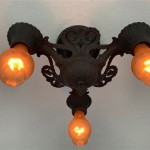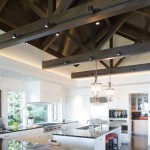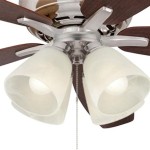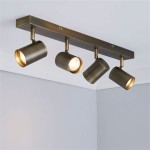Benefits of Installing Recessed Lights in Ceilings
Recessed ceiling lights, also known as can lights, have become increasingly popular in residential and commercial spaces due to their numerous advantages. These fixtures offer a sleek and modern aesthetic, provide ambient lighting, and can be customized to suit various design preferences. Here's a comprehensive guide to the essential aspects of recessed lights in ceilings:
Types of Recessed Lights
Recessed lights are available in three main types:
- Fixed Recessed Lights: These lights are permanently installed into the ceiling and cannot be adjusted. They provide general ambient lighting and are ideal for larger spaces.
- Adjustable Recessed Lights: These lights have a gimbal mechanism that allows the user to adjust the angle of the light. They provide more flexibility and can be used to highlight specific areas or create accent lighting.
- Semi-Recessed Lights: These lights have a slim profile that protrudes slightly from the ceiling. They offer a transitional look that combines the benefits of recessed and surface-mounted fixtures.
Choosing the Right Size and Shape
The size and shape of the recessed lights should complement the room's décor and dimensions. Smaller lights are suitable for tight spaces, while larger lights are recommended for larger areas. Round, square, and rectangular shapes are the most common options.
Trim Options
The trim, or bezel, around the light fixture frames it and adds a decorative touch. Trim options include:
- Flanged: This trim has a raised edge that rests on the ceiling surface.
- Trimless: This trim creates a seamless, flush appearance, blending the light fixture into the ceiling.
- Eyeball: This trim has an adjustable eyeball that allows for precise light direction.
Lighting Output and Color Temperature
The lighting output of recessed lights is measured in lumens. Choose a higher lumen output for brighter illumination and a lower lumen output for ambient lighting. The color temperature refers to the color of the light, ranging from warm white to cool white. Warm white creates a cozy atmosphere, while cool white provides a more energizing effect.
Energy Efficiency
Recessed lights are available with a range of energy efficiency ratings. LED recessed lights are significantly more energy-efficient than traditional incandescent or halogen lights. They consume less energy and have a longer lifespan, reducing operating costs.
Installation
Recessed lights require professional installation. An electrician will need to cut holes into the ceiling, install the housing, and wire the lights. Proper installation ensures optimal performance and safety.
Conclusion
Recessed lights in ceilings offer numerous advantages, from enhancing aesthetics to providing practical illumination. By carefully considering the type, size, trim, lighting output, and color temperature, you can create the perfect lighting scheme for your space. Remember to engage the services of a qualified electrician for professional installation to ensure a safe and functional lighting system.

How Recessed Lighting Elevates Your Living Space Goldberg Home

Recessed Lighting Guide Lowe S

How To Put Recessed Lights In The Ceiling

Designers Fountain 5 In And 6 White 4000k Integrated Led High Lumen Recessed Can Light Trim Rb6whwh9t1440 The Home Depot

New Recessed Lighting Dots Dashes Lightology

Recessed Lighting Led Lights Wac

A Guide To Recessed Lighting 9 Trim Styles Know

Commercial Electric High Ceiling 6 In White Integrated Led Recessed Can Light With Changeable Trim Ring Cer6041bwh30 The Home Depot

Torchstar 16 Pack 4 Ceiling Recessed Light With J Box 10w 80w Eqv Dimmable Led Downlight 2700k Soft White Com

The Pros Cons Of Recessed Lighting For New Construction
Related Posts








